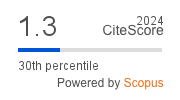Relieving idiopathic dental pain without drugs
Downloads
Background: Teeth are commonly obvious source of orofacial pain. Sometimes the pain source is undetectable, thus called as idiopathic dental pain. Since dentist wants to alleviate or eliminate the pains with every effort in their mind, a lot of drugs could be prescribed. Moreover, it is make sense that endodontic treatment or even tooth extraction will be done. Unfortunately, endodontic treatment may also initiate neuropathic tooth pain that is caused by nerve extirpation, thus worsen the pain. Therefore, another cause of dental pain such as referred pain, periodontal disease, or stress which related to psychoneuroimmunology should be considered. In order to prevent from unnecessary drugs or invasive treatment such as root canal treatment and extraction, correct diagnosis and preliminary non-invasive therapies should be done. Purpose: This review elucidates several therapies that could be done by dentists for relieving idiopathic dental pain which includes massage, the "assisted drainage” therapy, modulation of psychoneuroimmunologic status and dietary omega-3. Reviews: Understanding the basic pathogenesis of pain may help in elucidating the effects of non-drug pain therapy such as muscle massage, the "assisted drainage” therapy, omega-3 and psychological stress relieving. These measures are accounted for eliminating referred pain, reducing proinflammatory mediators and relieving unwanted stress reactions consecutively. Psychological stress increases proinflammatory cytokines and thus lowered pain threshold. Conclusion: As an individual treatment, this non-drug therapy is useful in relieving idiopathic dental pain; nevertheless, if they work together the result could be more superior.
Latar belakang: Gigi adalah suatu penyebab umum dari nyeri orofasial. Kadang kala penyebab nyeri tidak dapat ditemukan, sehingga disebut sebagai nyeri gigi idiopatik. Karena dokter gigi berupaya untuk mengurangi atau menghilangkan nyeri dengan segala cara maka banyak obat akan diresepkan ke pasien. Bila gagal maka sangat mungkin dilakukan perawatan saraf gigi bahkan pencabutan gigi. Akan tetapi, perawatan endodontik juga dapat menimbulkan nyeri neuropatik yang disebabkan oleh ekstirpasi saraf gigi, sehingga nyeri makin parah. Sebab itu, penyebab lain nyeri gigi seperti nyeri yang dialihkan (referred pain), penyakit periodontal atau stres yang berhubungan dengan psikoneuroimunologi perlu dipertimbangkan.Untuk mencegah kejadian konsumsi obat yang tidak perlu ataupun perawatan endodontik dan pencabutan gigi maka diagnosis yang tepat dan terapi non-invasif harus dilakukan terlebih dahulu. Tujuan: Studi pustaka ini menerangkan beberapa terapi yang dapat dilakukan dokter gigi untuk mengurangi nyeri gigi idiopatik yaitu masase, terapi assisted drainage,modulasi status psikoneuroimunologi dan diet omega-3. Tinjauan Pustaka: Pengetahuan mengenai patogenesa nyeri dapat menerangkan efek terapi nyeri non-medikamentosa seperti masase otot, terapi assisted drainage, diet omega-3 dan mengurangi stres psikologis. Berbagai terapi ini dapat mengurangi nyeri alihan, mediator proinflamasi dan mengurangi stres. Stres psikologis akan mengingkatkan sitokin proinflamasi yang menurunkan ambang nyeri. Kesimpulan: Sebagai terapi individual, terapi non-medikamentosa ini berguna untuk mengurangi nyeri gigi idioaptik, akan tetapi bila bekerja sama dapat lebih baik lagi.
Downloads
- Every manuscript submitted to must observe the policy and terms set by the Dental Journal (Majalah Kedokteran Gigi).
- Publication rights to manuscript content published by the Dental Journal (Majalah Kedokteran Gigi) is owned by the journal with the consent and approval of the author(s) concerned.
- Full texts of electronically published manuscripts can be accessed free of charge and used according to the license shown below.
- The Dental Journal (Majalah Kedokteran Gigi) is licensed under a Creative Commons Attribution-ShareAlike 4.0 International License

















